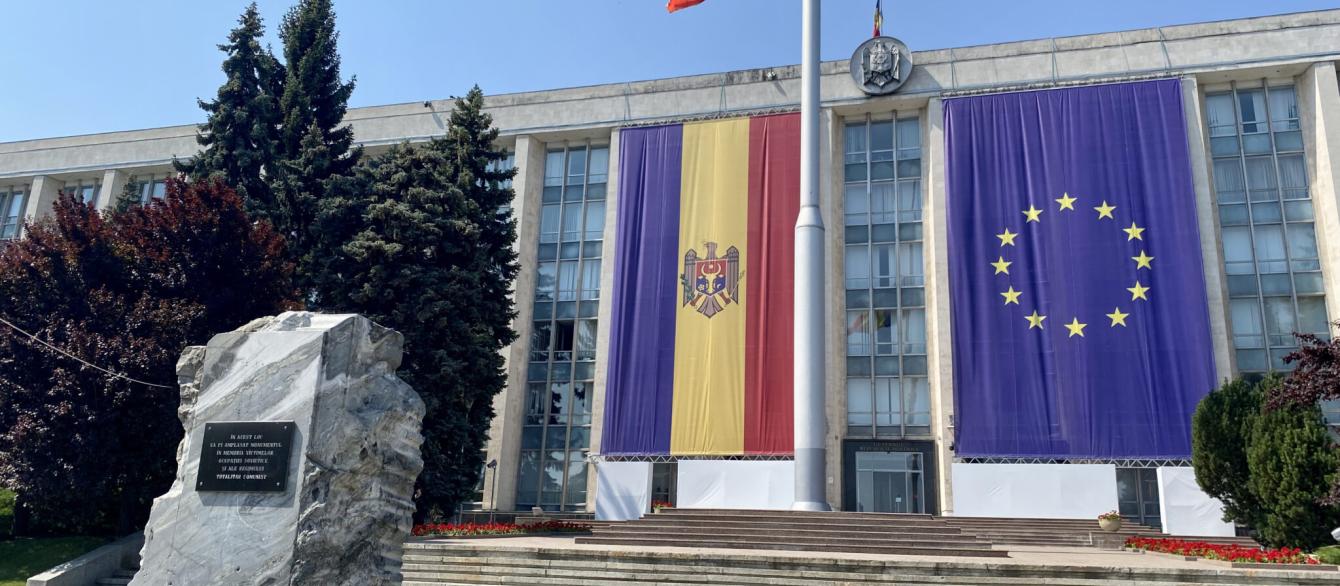Update: Moldova’s pro-Western President Maia Sandu won a second term in the pivotal Nov. 3 presidential runoff, AP reports.
This article was originally published by Good Authority and is shared under a CC BY-ND 4.0 DEED license.
On Sunday, Oct. 20, Moldovans voted on two consequential issues: whether to reelect their pro-European president Maia Sandu for a second term and whether to support a referendum to enshrine Moldova’s aspirations for E.U. membership in the constitution.
The campaign season was full of controversy, with Kremlin-friendly forces working diligently to sabotage Moldova’s European trajectory. Ultimately, the pro-E.U. referendum passed by a razor-thin margin. But Sandu failed to secure a majority of votes in the first round of the election, setting her up for a Nov. 3 run-off against pro-Russian challenger Alexandr Stoianoglo.
Western leaders hailed the election as a victory for European integration and a defeat for Vladimir Putin. But the close race also laid bare the East-West divisions within Moldovan society — and Moscow’s eagerness to widen these divisions for its own geopolitical gain.
Competing Geopolitical Trajectories
A country of about 3 million people nestled between Romania and Ukraine, Moldova has long been at the crossroads of competing geopolitical worldviews. In a previous explainer, we offered a brief look at Moldova’s complex history: a century of Russian rule; two decades of attempted modernization under interwar Romania that were thwarted by a violent Soviet takeover; wartime occupation by Nazi-allied Romania; re-assertion of Soviet control at the end of World War II, accompanied by the mass repressions and collectivization that characterized the Stalinist period; and four decades as part of the Moldavian Soviet Socialist Republic.
Moldova has an ethnically diverse population but is majority Romanian-speaking. Since the collapse of the Soviet Union, the country has oscillated between East and West. In 2001, Moldova became the only former Soviet republic to vote an unreformed communist successor party back into office. In 2009, the Communist Party was ousted in a highly contested set of parliamentary elections, sparking Moldova’s “Twitter Revolution.”
Russia Continues to Exert Leverage
The ensuing decade saw a similar tug-of-war between pro-European and pro-Russian camps. But over time, Moldovans have gravitated to the West. Grants from the European Union trickled in, and in 2013 Moldova signed an E.U. Association Agreement, creating a framework for greater economic and political cooperation. In 2020, Harvard-educated former minister of education Maia Sandu replaced Socialist Party leader Igor Dodon as president of Moldova. In June 2022, Moldova and Ukraine became candidates for E.U. membership.
But Russia retains many sources of leverage over Moldova. Russian media outlets remain highly popular, especially among Russian-speakers. Sandu banned these outlets in the wake of Russia’s 2022 invasion of Ukraine, but people can still access the content online. Russia was an important economic partner until the Moldovan government restricted trade after the full-scale invasion. Many Moldovans continue to work in Russia and send remittances to their families back home.
And Russia holds a geopolitical trump card: Transnistria, a thin slice of territory across the Dniester River that receives free Russian gas and has housed a small detachment of Russian troops since 1992. (See our previous article for the full story on Transnistria.)
The stakes, of course, are high. Moldova’s direct neighbor is Ukraine, where Russia is waging a full-scale war. Indeed, Russian officials hinted at plans to conquer a swath of Ukrainian territory up to Transnistria, directly imperiling Moldova. Ukraine’s resistance has kept Moldova safe from Russian troops thus far. But the consequences of the war have been severe: an energy crisis, price increases, and an influx of Ukrainian refugees. Moreover, Moldova remains vulnerable to Russian disinformation and manipulation by other means. Russia’s intentions became very clear during the October 2024 elections.
Russia-Friendly Candidates Played Musical Chairs
Analysts expressed concern about Russian destabilization efforts long before Moldovans went to the polls. To nobody’s surprise, evidence of Russian meddling and disinformation emerged early on.
A first step was determining who would run as the “pro-Russian” candidate to challenge Sandu, the incumbent. Former president Dodon, the ostensible frontrunner, announced in July that he would not seek another term. Perhaps Dodon wanted a break from the spotlight; he was arrested in May 2022 as anti-corruption prosecutors raided his properties, discovering huge amounts of cash. They also apprehended his brother-in-law, who was caught trying to swallow a receipt.
Dodon endorsed former prosecutor-general Alexandr Stoianoglo, whom Sandu fired last year for his failure to combat corruption. Stoianoglo, a political newcomer, claims to be in favor of European integration but opposed the E.U. referendum. Like Sandu, he holds dual Moldovan-Romanian citizenship.
Most of the accusations and evidence of Russia’s election meddling relate to Ilan Shor, a fugitive oligarch and former mayor of the mid-sized city of Orhei. Shor is one of the key suspects in a 2014 bank scandal: $1 billion — about 12% of Moldova’s GDP at the time — was transferred out of Moldovan banks as dubious loans. He fled the country in 2019, but still managed to get elected to parliament and organize demonstrations from exile. In June 2023, Moldova’s Constitutional Court banned Shor’s eponymous political party. A recent investigative report revealed that Shor, working from Moscow, funneled millions of dollars in cash into Moldova through local proxies in exchange for a promise to vote “no” on the E.U. referendum.
The EU Referendum Passed — Barely
In the midst of this drama, Moldovans went to the polls on Oct. 20 to cast two important votes. First, they chose among 11 registered candidates for president — including Sandu, Stoianoglo, Renato Usatîi (former mayor of Bălți, Moldova’s second-largest city, known for public karaoke performances and his business ties with Russian Railways), and various lesser-known politicians.
Second, Moldovans voted on a referendum that would “modify the Constitution with the goal of [the] Republic of Moldova’s accession to the European Union.” This referendum was not equivalent to a yes/no vote on E.U. membership itself — an important nuance lost in many media reports on the election. Voting “no” could signify not just an anti-E.U. stance but also a vote against amending the constitution. In private conversations last summer, one of us heard several Moldovan academics and politicians complain that Sandu’s decision to call the referendum was self-serving, as she intended to use pro-E.U. sentiment to boost her own electoral prospects.
As the votes poured in on the evening of Oct. 20, many European-leaning Moldovans were shocked that a majority of votes cast inside the country indicated “no” to the referendum. But once the votes cast by Moldova’s large and overwhelmingly pro-European diaspora were incorporated into the totals, the referendum managed to pass — by a slim 50.4% majority. The pro-Russian opposition’s mixed messaging about whether to boycott the referendum or vote “no” turned out to be a strategic blunder. In fact, if all of the people who opted to boycott had instead voted “no,” the referendum would likely have failed.
The presidential election also proved contentious. Although Sandu won a plurality of votes — 42.5% — she did not secure the majority necessary to become president. That means she must now face a Nov. 3 runoff against the second-place candidate, Stoianoglo. Sandu’s victory is by no means guaranteed, given the uncertainty regarding turnout and how votes from other candidates — particularly third-place Usatîi — will be redistributed.
Unpacking These Election Results
The results of the Oct. 20 election deviated substantially from pre-electoral polls but were in line with several longer-term trends in Moldovan politics. First, we observed an electorate split along ethno-linguistic lines. Historically pro-Russian regions remained fairly steadfast in their support for opposition candidates. Although vote-buying and manipulation certainly inflated the anti-E.U., anti-Sandu votes, much of the resistance to Moldova’s European path is more deeply rooted.
Second, the elections highlight Moldova’s precarious geopolitical balancing act. The promises of European integration compete with lingering dependence on Russia through linguistic, cultural, and — crucially — informational and economic ties.
Third, we witnessed the challenges of governance in Moldova, a landlocked country with problems of poverty and corruption. Some voters have become disenchanted with the pace of progress in the country since Sandu’s election in 2020, even though she had to navigate the twin crises of covid-19 and Russia’s invasion of Ukraine. Lastly, it is important to emphasize the critical role that the diaspora played in the election: Both Sandu and the E.U. referendum earned over 70% of votes cast abroad.
Moldova’s Uncertain Future
On Sunday [Nov. 3] Moldovans will head to the polls for the second round of the presidential election. Sandu secured a much larger vote share than Stoianoglo in the first round. But the pro-Russian challenger could still win, depending on how votes for other candidates are redistributed. Turnout in the first round was 51%, which means that many voters — including diaspora voters — can still be mobilized.
The threat of further Russian interference and political instability looms over this run-off. In the Oct. 27 presidential debate, Stoianoglo asked Sandu to promise not to challenge the outcome of the second round. Although this proposal seems a reasonable one, it means nothing if fraud and manipulation spoil the election. Hopefully, Moldovan institutions are able to combat these challenges and ensure their citizens a free and fair vote.
Even if Sandu manages to win a second term, the upcoming parliamentary elections in spring 2025 will prove still tougher for her political party, the Party of Action and Solidarity (PAS). Sandu’s personal popularity is much higher than that of PAS, and the opportunities for Russian influence are greater, given the number of seats up for grabs.
Also worth noting: The outcome of the U.S. presidential election has consequences for Moldova, Ukraine’s neighbor. Donald Trump and his running mate, J.D. Vance, have expressed wavering support for Ukraine and promised to put a speedy end to the war. Any losses for Ukraine could put Russian troops even closer to Moldovan territory and potentially empower Russia to engage in further meddling beyond its borders.








